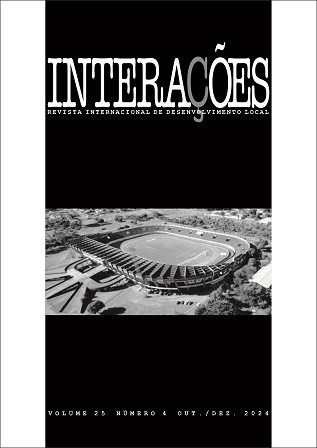Meanings of refugee’s ethnic food in the city of São Paulo from the perspective of welcoming
Keywords:
Hospitality, Welcoming, Ethnic Food, Refugee, Sao Paulo-SPAbstract
This article discusses the different meanings of ethnic food for enterprising refugees in the city of São Paulo, from the perspective of reception, and its object of study is the sale of so-called ethnic/traditional food, in small businesses. From a survey of articles, we sought to investigate the presence of welcoming and sociability in the ethnic food trade, through qualitative analysis. In addition, semi-structured interviews were carried out in loco with enterprising refugees from Syria, Palestine, Turkey, Uganda and Venezuela, in order to investigate the context of refuge, ethnic origin, motivations to undertake in the area of gastronomy and meanings of their food from origin. After content analysis of the dialogic elements of the interviews, triangulation was performed with dimensions inherent to the theory of hospitality. The results show that the refugees interviewed have very different histories of reception upon their arrival in Brazil. In addition to sustenance, ethnic food provides visibility to their culture, customs, and realities, which differ from those portrayed in the media – often characterized by conflict, war, and poverty. Moreover, through ethnic food, new social relationships are established.
References
AGÊNCIA DA ORGANIZAÇÃO DAS NAÇÕES UNIDAS PARA OS REFUGIADOS [ACNUR]. Dados sobre refúgio. ACNUR, Brasília-DF, 2018a. Disponível em: https://www.ACNUR.org/portugues/dados-sobre-refugio/dados-sobre-refugio-no-brasil/. Acesso em: 11 jul. 2019.
AGÊNCIA DA ORGANIZAÇÃO DAS NAÇÕES UNIDAS PARA OS REFUGIADOS [ACNUR]. Global Trends Forced Displacement in 2017. Relatório das tendências globais para deslocamentos forçados em 2017. ACNUR, Brasília-DF, 2018b. Disponível em: https://reporting.unhcr.org/sites/default/files/gr2017/pdf/GR2017_English_Full_lowres.pdf. Acesso em: 14 jul. 2018.
AGÊNCIA DA ORGANIZAÇÃO DAS NAÇÕES UNIDAS PARA OS REFUGIADOS [ACNUR]. Global Trends Forced Displacement in 2020. Relatório das Tendências Globais para Deslocamentos Forçados em 2020. ACNUR, Brasília, 2021. Disponível em: https://www.unhcr.org/60b638e37/unhcr-global-trends-2020#_ga=2.186093740.429458667.1624770634-1918520658.1624770634. Acesso em: 13 out. 2022.
AMON, D. Saberes da comida: identidade, comunidade e memória social. In: AMON, D. Psicologia Social da Comida. São Paulo: Editora Vozes, 2014. p. 182–201
BAENINGER, R. Introdução. Migrações Sul-Sul. 2. ed. Campinas: Nepo/Unicamp, 2018.
BARDIN, L. Análise de conteúdo. Versão ampliada e revisada. São Paulo: Edições 70, 2011.
BAUMAN, Z. Estranhos à nossa porta. Rio de Janeiro: Zahar, 2017.
BELL, D. Gosto e espaço: comer fora nos dias de hoje. In: SLOAN, D. Gastronomia, restaurantes e comportamento do consumidor. Barueri, SP: Manole, 2005. p. 51–68.
BINET-MONTANDON, C. Acolhida: uma construção do vínculo social. In: MONTANDON, A. (Dir.). O livro da hospitalidade: acolhida ao estrangeiro na história e nas culturas. São Paulo: Senac, 2011. p. 1171–84.
BOURDIEU, P. A distinção: crítica social do julgamento. Porto Alegre: Editora Zouk, 2007.
CAMARGO, L. O. L. As leis da hospitalidade. Revista Brasileira de Pesquisa em Turismo, São Paulo, v. 15, n. 2, e-2112, maio/ago. 2021. http://dx.doi.org/10.7784/rbtur.v15i2.2112
DERRIDA, J. Anne Duformantelle convida Jacques Derrida a falar da hospitalidade. São Paulo: Escuta, 2003.
DIAS, B. Conheça 7 restaurantes comandados por refugiados em São Paulo. Urban Taste, UOL, [s.l.], 2019. Disponível em: https://www.uol.com.br/urbantaste/noticias/redacao/2019/08/27/conheca-7-restaurantes-comandados-por-refugiados-em-sao-paulo.htm. Acesso em: 15 jan. 2020.
GOMES, L. A. S.; LE BOURLEGAT, C. A. Empreendedorismo étnico e de autoemprego em um olhar para as comunidades de imigrantes. Interações, Campo Grande, v. 21, n. 2, p. 317–30, 2020. DOI: http://dx.doi.org/10.20435/inter.v21i2.2287
GOTMAN, A. O turismo e a encenação da hospitalidade. In: BUENO, M. L.; CAMARGO, L. O. de L. (Org.). Cultura e consumo: estilos de vida na contemporaneidade. São Paulo: Senac, 2008. p. 115–34.
GRASSI, M. C. Transpor a soleira. In: MONTANDON, A. (Org.). O livro da hospitalidade. São Paulo: Senac, 2011, p. 45–62.
HALTER, M. Cultura econômica do empreendimento étnico: caminhos da imigração ao empreendedorismo. Revista de Administração de Empresas, [s.l.], v. 47, n. 1, p. 99–115, 2007. Disponível em: http://dx.doi.org/10.1590/S0034-75902007000100014
HECK, M.; BELLUZZO, R. Cozinha dos imigrantes – memórias & receitas. São Paulo: Melhoramentos, 1999.
KWON, D. Y. What is ethnic food? Journal of Ethnic Foods, [s.l.], v. 2, n. 1, p. 1–6, 2015. DOI: http://dx.doi.org/10.1016/j.jef.2015.02.001
LÉVI-STRAUSS, C. O cru e o cozido. São Paulo: Brasiliense, 1991. [Originalmente publicado em 1965].
LUCENA, C. T. Saberes e sabores do país de origem como forma de integração. Cadernos CERU, v. 19, n. 1, p. 65–80, 2008. Disponível em: https://doi.org/10.1590/S1413-45192008000100005
MINAYO, M. C. S. A inclusão da violência na agenda da saúde: trajetória histórica. Ciência & Saúde Coletiva, n. 11, p. 1259–67, 2006. DOI: https://doi.org/10.1590/S1413-81232006000500015
MONTANARI, M. Comida como cultura. São Paulo: Senac, 2008.
OPEN TASTE BRASIL. What's cooking?[s.l.], 2020. Disponível em: https://www.opentastebrasil.org/delivery. Acesso em: 8 jul. 2020.
PITT-RIVERS, J. The law of hospitality. HAU: Journal of Ethnographic Theory, [s.l.], v. 2, n. 1, p. 501–17, 2012. DOI: https://doi.org/10.14318/hau2.1.022
RAFFESTIN, C. Réinventer l'hospitalité. Communications, Paris, n. 65, p. 165–77, 1997. DOI: https://doi.org/10.1590/S1413-81232006000500015
SASSEN, S. Expulsões: brutalidade e complexidade na economia global. Rio de Janeiro/São Paulo: Paz e Terra, 2016.
SCAGLIUSI, F. B., PORRECA, F. I., ULIAN, M. D., SATO, P. M.; UNSAIN, R. F. Representations of Syrian food by Syrian refugees in the city of São Paulo, Brazil: an ethnographic study. Appetite, [s.l.], n. 129, p. 236–44, 2018. DOI: https://doi.org/10.1016/j.appet.2018.07.014
SIMMEL, G. Questões fundamentais da sociologia: indivíduo e sociedade. Rio de Janeiro: Zahar, 2006.
TEY, Y. S., ARSIL, P., BRINDAL, M., LIEW, S. Y., TEOH, C. T., TERANO, R. Personal values underlying ethnic food choice: means-end evidence for Japanese food. Journal of Ethnic Foods, [s.l.], v. 5, n. 1, p. 33–9, 2018. DOI: https://doi.org/10.1016/j.jef.2017.12.003
WORLD POPULATION REVIEW. World City Populations 2021. [s.l.], 2021. Disponível em: https://worldpopulationreview.com/world-cities
Downloads
Published
How to Cite
Issue
Section
License
Copyright (c) 2024 Vera Lúcia Stahelin Rustomgy , Sênia Regina Bastos

This work is licensed under a Creative Commons Attribution 4.0 International License.
Direitos Autorais para artigos publicados nesta revista são do autor, com direitos de primeira publicação para a revista. Em virtude de aparecerem nesta revista de acesso público, os artigos são de uso gratuito, com atribuições próprias, em aplicações educacionais e não-comerciais.


